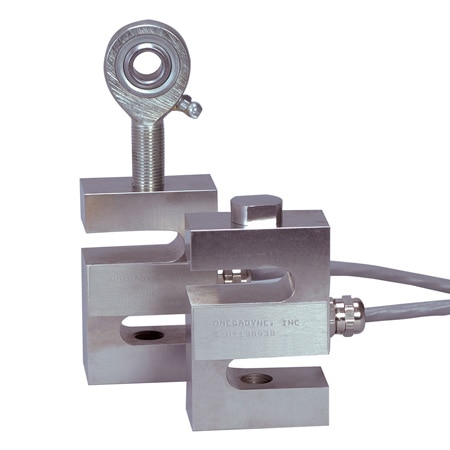Welcome to our new website, found an issue or bug? Please report it here

LC101
Stainless Steel S-Beam Load Cells
Models In Stock
- Being replaced by our new and improved LC103B Series
- 5-Point NIST Traceable Calibration with
59K Shunt Data Included - All Stainless Steel for Harsh Industrial Applications
- 0.25% Interchangeable for Multiple Load Cell Applications
LC101
From
$
585.38
Models In Stock
Product Overview
- 5-Point Calibration 0%, 50%, 100%, 50%, 0%
- Calibration Option 5 POINT NIST
- Electrical Output 3 mV/V
- Force Type Tension
- Full Scale Deflection 0.02 in
- Input Resistance 350 ± 10 Ω
- Interchangeability 0.0025
- Load Cell Type S-beam
- Materials 17-4 PH Stainless Steel
- Operating Temperature, Max 93 °C
- Operating Temperature, Min -40 °C
- Output Resistance 350 ± 10 Ω
- Overload, Max 300% FS
- Process Temperature, Max 71 °C
- Process Temperature, Min 17 °C
- Safe Overload 1.5
- Supply Power Note 10 Vdc, 15 Vdc maximum
- Supply Voltage 10 Vdc
- Thermal Span Effect 0.002% FSO/°C
- Thermal Zero Effect 0.002% FSO/°C
- Zero/Balance Error ± 1%
The LC101 series has been replaced by the LC103B series. The new LC103B series has the same features and high accuracy but at a lower price point. Many ranges are in stock available for immediate shipment.
S-Beam load cells that receive tension or compression output readings. Applications include tank weighing hoppers suspended loads and truck scales. S-Beam load cells provide superior performance in an compact versatile package. Install using rod ends or load buttons for best performance.The LC101 & LC111 are also available in metric configurations with ranges from 0-10 to 0-10 000 kgf and metric threads. Please see the LCM101 for complete details or contact our Pressure department for more information.
SPECIFICATIONS
Excitation: 10 Vdc 15 Vdc max
Output: 3 mV/V ± 0.0075 mV/V
Linearity: ± 0.03% FSO (0.1% 40 K)
Hysteresis: ± 0.02% FSO (0.1% 40 K)
Repeatability: ± 0.01% FSO (0.05% 40 K)
Zero Balance: ± 1% FSO
Operating Temp Range: -40 to 93°C (-40 to 200°F)
Compensated Temp Range: 17 to 71°C (60 to 160°F)
Thermal Effects:
Zero: 0.002% FSO/°C
Span: 0.002% FSO/°C
Safe Overload: 150% of capacity
Ultimate Overload: 300% of capacity
Input Resistance: 350 ± 10 ?
Output Resistance: 350 ± 10 ?
Full Scale Deflection: 0.25 to 0.51 mm (0.010 to 0.020")
Construction: 17-4 PH stainless steel
Electrical (LC101/LCM101): 4-Conductor Shielded Cable
<100 kgf/250 lb: 9 m (30') 24 AWG
250 to 1000 kgf/250 to 2000 lb: 9 m (30') 20 AWG
?1500 kgf/3000 lb: 4.5 m (15') 20 AWG
Mating Connector (LC111/LCM111):
?100 kgf/200 lb: PT06F8-4S sold separately
?250 kgf/250 lb: PT06F10-6S sold separately
PDFs & Manuals
Show Ratings & Reviews
Rated 5 out of
5
by
wolf460 from
The S beam load cell
I received my load cell several weeks ago and it is well worth the value. The accuracy, durability, and workmanship are outstanding.
Date published: 2017-02-13
Rated 5 out of
5
by
Indiana_tester from
Great load cell, when it is available in time.
We have several of these in our product test lab, and they work great, just as described. They are accurate. We excite them with an Omron 12V power supply and feed the signal into a National Instrument C Series analog input module. My only gripe is lead time. We have had to choose a less-than-optimal load range and the hard-wired cord instead of the bayonet lug because the one we wanted was 4, 8 or 12 weeks lead time. I wish it didn't take so long to get a catalog item.
Date published: 2019-02-28
Rated 5 out of
5
by
Larry Legend from
This works great for our application.
This unit will last us approximately one year and gets used constantly on a daily basis.
Date published: 2017-03-13
Rated 5 out of
5
by
Progressive Electric from
Omega Load Cell review
Great product, we use these units in multiple test locations and they stand up to harsh environments.
Date published: 2022-01-04
Rated 5 out of
5
by
Felix83 from
Awesome service
The service is exceptional. Got my item as expected and on time.
Date published: 2017-01-26
Is this load cell susceptible to high vibration? I am running a test that sees significant vibration for 24 hours or longer and the last load cell that I had stopped working. The load was consistent between 2000-2050 LBS and the load cell stopped working.
The short answer is yes.
Load cells have a difficult time because of their construction .
The wires can break and the connection would be lost.
Also theirs the issue of overloading.
Please contact us to discuss with are engineers of a possible solution.
Date published: 2021-06-16
What is a minimum load for a LC101-250 load cell?
Thank you for your inquiry, the LC101-250 is an analog device that should respond to any change it sees.
Date published: 2022-02-18
what is the frequency response of the load cells? Can they be used to measure dynamic (variable in time at high frequency) loads?
Thank you for contacting Omega. The load cells we carry are not intended for high frequency measurements. Typically they are good for measurements up to about 100 Hz.
Date published: 2019-10-01
I wanted to know what is a compatible amplifier that we can use with this load cell, LC101-50?
Thank you for your inquire
We have a variety of amps available a few models are DMD466,DMD4059 & DMD465
Date published: 2021-09-13
Can the top and bottom rest against a surface or does the load cell need to be off set with rod ends?
Tank you for your question?
The load cell works best with rod ends or a load button.
The cell will still work if you measure the load with the top and bottom
Date published: 2019-06-27